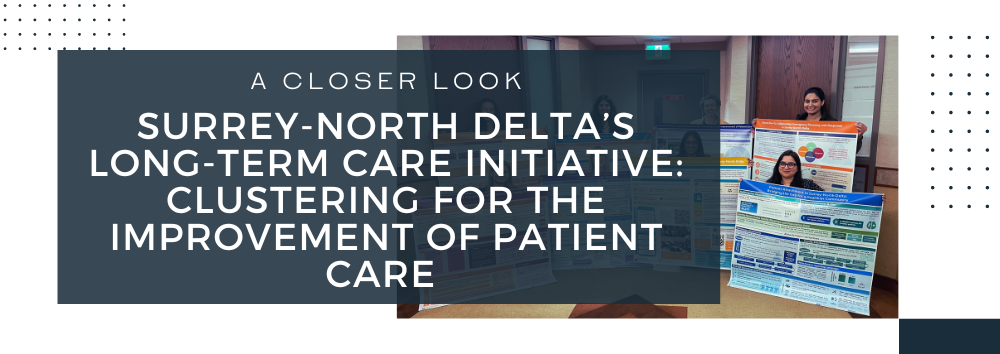
FP Lead: Dr. Mark Blinkhorn
In April of 2024, the Surrey-North Delta Division of Family Practice showcased eight health system enhancement initiatives that we and our partners have been undertaking in our community. These are the stories behind the storyboards.
Imagine an 89-year-old woman, let’s call her Doris, has a fall in her home and ends up in the hospital with a broken hip. During her time at the hospital, it becomes clear that Doris will no longer be able to live safely in her independent living situation. Her family, wanting what’s best for Doris, find her a spot at a long-term care facility, also called a community of care. But the hospital can’t discharge her. Why? Because the community of care can’t find a family doctor who is available to care for Doris within the facility, even though they have a space open and ready for her.
Meanwhile, the hospital is running out of space to admit new patients in need of care.
Doris’ situation used to be a common one in Surrey-North Delta, until a group of family doctors came together as a team to do something about it.
To address the clear need, the physicians developed a cohort system where three to five physicians are clustered at each community of care. These clusters facilitate the provision of team-based care, including after-hours coverage, care conferences, medication reviews and mentorship of physicians who are new to long-term care.
Eventually named the Long-term Care Initiative, the approach developed by these physicians has led to a significant improvement. In fact, no patients in Surrey-North Delta are delayed now in being discharged to a community of care due to not having access to a family doctor.
April Bonise is the project manager supporting this initiative. Here are some of her thoughts.
--> Want to learn more? See our storyboard HERE.
What have been the highlights of working on this initiative?
The biggest highlight for me of working with the LTCI committee has been the opportunity to support the phenomenal work already being provided to our most vulnerable seniors by the physicians in our community.
It has been eye-opening for me to learn the intricacies involved in the long-term care work that our physicians do.
Another recent highlight for me was the launch of the LTCI dementia pilot. This ran in our 13 communities of care with the aim of improving the quality of life for patients living with dementia.
Why do you feel that the work being done here is important? What is the impact you’re hoping it will have for physicians? For patients?
Caring for elders in our community who have transitioned into long-term care is some of the most complex work a family physician can do and not many physicians do it. Even though our LTCI physicians make up a small group, their work has made a direct, positive impact on a huge number of patients who are at the end of their life’s journey, along with their families.
How has member participation contributed to this project’s success?
If we didn’t have physician members doing this work, we would have a significant number of elders in care without adequate primary care and their quality of life would be significantly compromised.
Our physician members all believe in maintaining a collegial relationship with one another and that this relationship is the basis for the delivery of exceptional care.
What’s next for this work?
A new payment model for long-term care is being rolled out so we are actively assessing the impact of this and determining with our physician members how best to continue supporting them and their communities of care. Whatever happens, we will continue to support our LTC physicians and our communities of care to do the work that they do best.



